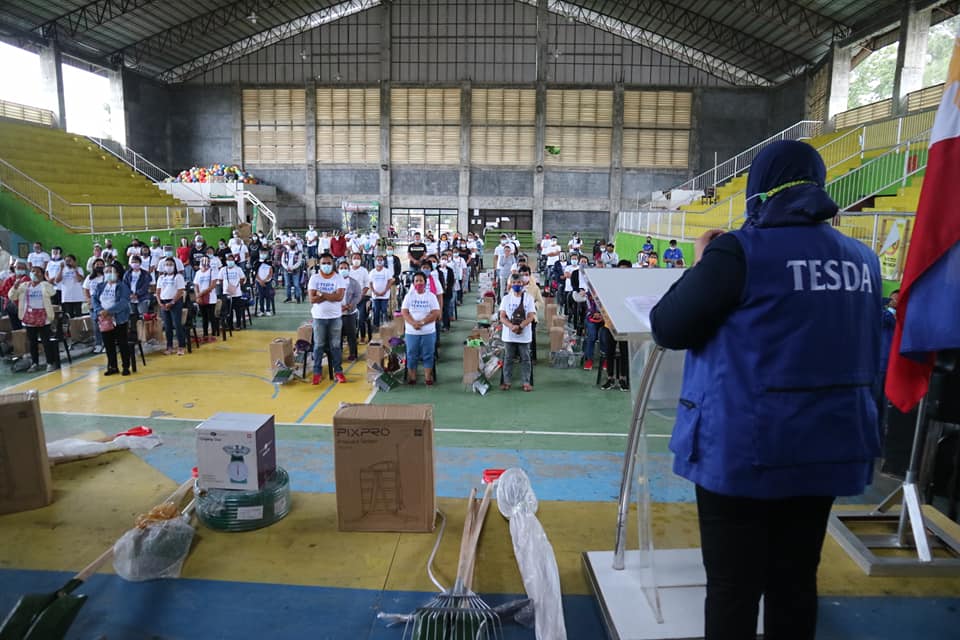Context: The COVID-19 pandemic has greatly impacted the economy and labour market in the Philippines. Approximately 10.9 million workers have been affected by COVID-19, including adjustments to salaries, working hours and employment status. From January 2020 to January 2021, the country’s unemployment rate increased from 5.3 to 8.7 per cent. In February 2021, the number of unemployed Filipinos over the age of 15 was estimated at 4.2 million. In order to mitigate the impacts of the pandemic, in 2021, the Government of the Philippines aims to provide between 2.4 to 2.8 million jobs using a variety of new and existing employment programmes.
Implementation of programme/ initiative: The Special Training for Employment Program (STEP) is a training initiative established by the Philippines’ Technical Education and Skills Development Authority (TESDA). In 2014, STEP was initiated to increase employability and productivity by providing skills and training opportunities in local communities. Beneficiaries of the programme receive free short term training in entrepreneurial, self-employment and service-oriented activities, as well as free competency assessments. Applicants are required to be Filipino nationals and over the age of 15. The duration of the training depends on the course taken, ranging from 100 to 1000+ hours. The courses offered focus primarily on the following sectors: agriculture and fishery; automotive and land transport; heating, ventilation, air-condition and refrigeration; construction; visual arts; electronics; furnishing and fixtures; garments; health, social and other community development services; and metals and engineering. Aside from being given a daily allowance of PHP60 (USD3), beneficiaries of STEP are receive starter toolkits tailored to each field of study, to further assist them in finding jobs or starting their own businesses.
Main challenges: The main challenges that the programme has faced are underspent budgets and a lack of students. Since the start of the pandemic, the number of students attending TESDA’s 57 administered schools, 60 training centres, enterprise-based dual training programmes and community-based training classrooms has reduced drastically. Furthermore, as the budget for each province is managed at the local level, it is difficult for the Central Government to accurately trace how budgets are spent. In response to this, TESDA has been conducting internal audits to prevent any illegal activities and is offering rewards of PHP50000 for any information.
Results achieved: In 2015, approximately 21,000 students graduated from the programme. In 2019, the number of graduates peaked at 75,000. During the pandemic, this figure has reduced significantly. However, TESDA will continue to distribute toolkits to graduates to help them set their careers in motion. On 24 February 2021, over 2,000 graduates living in the Cordillera region successfully received starter toolkits. Additionally, on 20 March 2021, 289 scholars at the Northerm Mindano School received their starter toolkits.
Moving Forward: As it stands, most STEP training centres are in central provinces and urban areas. In order to increase accessibility among grassroots individuals (a key target group), STEP should consider constructing a greater number of training centres in rural areas. The programme could also consider collaborating with Balik Probinsya, a socioeconomic programme by the Philippines’ Government that aims to provide new opportunities to people following the COVID-19 pandemic by reversing migration into the country’s capital, and helping to enhance the quality of life in rural areas. Individuals returning to their home provinces could be enrolled into STEP training programmes matching the needs of their provinces.
Replicability: By increasing the amount of targeted vocational training and providing employment starter toolkits to citizens, countries can help increase labour force participation rates and stimulate economic development. In light of the economic impact of COVID-19, this is now more important than ever. Initiative of the above nature are particularly viable where large numbers of individuals are returning from urban areas to their home provinces; providing these workers with adequate resources is fundamental to ensuring a smooth transition into more local forms of employment.
Acknowledgement:
This good practice was kindly prepared by Ms. Juanying Xie.
References:
https://www.tesda.gov.ph/About/TESDA/1279
https://www.pna.gov.ph/articles/1131688
https://www.philstar.com/headlines/2020/11/12/2056325
Project Details
Date: April 28, 2021
